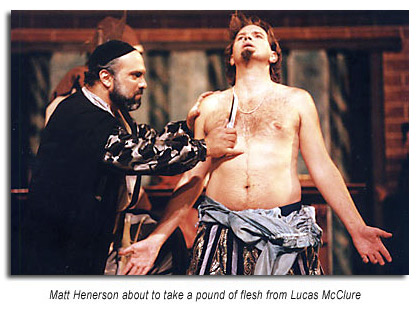| Plot points | Who's who? | Does your Team know the Themes? | Quoteworthy! | Figuratively speaking... |
| 10 | 10 | 10 | 10 | 10 |
| 20 | 20 | 20 | 20 | 20 |
| 30 | 30 | 30 | 30 | 30 |
| 40 | 40 | 40 | 40 | 40 |
| 50 | 50 | 50 | 50 | 50 |
| Final Question | ||||


Why is Shylock punished in the end? 

He is punished for trying to kill Antonio. Portia: 'If it be proved against an alien that by direct or indirect attempts he seek the life of any citizen, the party 'gainst the which he doth contrive shall seize one half his goods; the other half comes to the privy coffer of the state; and the offender's life lies in the mercy of the duke only.'

Why does Jessica elope? Give 2 reasons. 

1. She is in love with Lorenzo, but she will never be allowed to marry him legitimately, since he is a Christian while she is a Jew. 2. She finds living with Shylock unpleasant, saying 'our house is #!!##!!##!!##!!#' and that she is 'ashamed to be my father's child.'

How does Portia manipulate the situation so that she eventually gets Antonio to ask Bassanio to 'swear to keep [her] ring'? Refer to events in Acts 4 and 5. 

She acts as a lawyer and saves Antonio's life, then asks for her ring as payment. She acts offended when he refuses, thus Antonio asks Bassanio to give her the ring. Later, when Bassanio returns to Belmont without the ring, she feigns distress and indignance at his unfaithfulness, threatening to 'ne'er come in [his] bed until [she] sees the ring.' The whole situation is so dire that Antonio, as a good friend, feels he must speak up to defend Bassanio's actions and take the blame. Portia hence has the opportunity to place him under her obligation.

Name 2 ways in which Jessica is an example of deceptive appearances. 

1. She deceives Shylock into thinking she is an obedient daughter when she actually has plans to run away. She lies to Shylock, saying '[Launcelot's] words were 'Farewell mistress;' nothing else, when she was actually giving him a letter for Lorenzo. 2. She disguises herself as a boy to elope with Lorenzo.

Does Shakespeare condone discrimination? Use quotes to support your answer. 

To some extent he does, as the play's 'happy ending' entails victimization of Shylock the 'alien' and degrading him by making him go 'down... and beg mercy of the duke'. The main perpetrators of discrimination gain beneficial returns. However, Shakespeare paints Shylock in a sympathetic light and gives him a strong voice to confront the Christians with their common humanity when he asks, 'Hath not a Jew eyes?... If you prick us, do we not bleed?' Therefore Shakespeare does not fully condone discrimination but conveys the complexity surrounding the issue.

Who is more 'manly', Bassanio or Portia? Give 2 reasons for your point of view. 

1. Portia is wealthy, unlike Bassanio, who is impoverished. The gender stereotype is that the man will provide for the household, hence in financially supporting Bassanio, Portia takes on the more 'manly' role. 2. Bassanio begs ineffectively for Antonio's life, whereas it is Portia who supplies not only the money but the intellect and strategy to save him. In taking on a heroic, active role, Portia seems more 'manly' than the helpless Bassanio.

Why can't the Duke simply cancel the bond to spare Antonio? Give 2 reasons.  '>
'>
 '>
'>
1. As Antonio says in Act 3 Scene 3, 'The duke cannot deny the course of law: for the commodity that strangers have with us in Venice, if it be denied, will much impeach the justice of this state; since that the trade and profit of the city consisteth of all nations.' The prosperity of Venice relies on trade with many foreigners, hence the Duke cannot show bias in favour of Antonio, a Venetian. If he did, foreigners would no longer feel safe trading in Venice, as they are not treated fairly by the law. 2. As Portia says in Act 4 Scene 1, ''Twill be recorded for a precedent, and many an error by the same example will rush into the state.' If the Duke makes an exception in this case, he will have to make many exceptions in other cases to be consistent, which would result in chaos. This is related to the theme topics of Justice and Economic Transactions.

Act 5 opens with Jessica and Lorenzo playing a game of 'In such a night'. What does this exchange reveal about their relationship? 

1. The references are all to Greek tragedies, revealing that they are aware that their own story of forbidden love could have ended tragically. 2. Since all the references are to tragic stories which are quite melodramatic, the juxtaposition could be humourous, revealing a playful side to their relationship. That they are making a competitive game out of lovers' sweet nothings, and that in the final exchange they make jokes about each other, also reveals the playfulness in their relationship. 3. The exchange reveals that Jessica and Lorenzo are equals in intellect and education.

Portia and Nerissa's rings are symbols. What do they represent? Give quotes to support your answer. 

1. The rings represent the trust that Portia and Nerissa place in their husbands. Therefore, when they discover their husbands have given the rings away, they accuse their husbands of unfaithfulness, Nerissa saying, 'the clerk will ne'er wear hair on's face that had it', and Portia agreeing 'some woman had the ring.' 2. The rings represent Portia and Nerissa's chastity, and the bearer of the rings (which should be the husbands) have the exclusive right to sexual access. This is why Portia tells Bassanio, 'I will ne'er come in your bed until I see the ring' and threatens to 'have that doctor for [her] bedfellow'. Nerissa similarly threatens that she will be unfaithful to Gratiano with the clerk. 3. Portia's ring also represents a contract of economic transaction between herself and Bassanio. 'This house, these servants and this same myself are yours, my lord: I give them with this ring; which when you part from, lose, or give away, let it presage the ruin of your love and be my vantage to exclaim on you.'

What Would You Like To Risk?

|
|
|
|
|
||||||||||||||||||||||||||||||
|
|
|
|
|
||||||||||||||||||||||||||||||
Review Game Info:

You must save this address to be able to find and share your game!






















